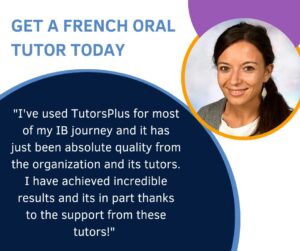In this guide, we will introduce you to French Ab Initio. In particular, its curriculum and syllabus, and how the exams are designed.
There are two options for students who wish to learn French as their second language – Language B and Ab Initio. The latter is designed for high school students with little to no prior experience in French.
While the level of French for Ab Initio is basic, learners are starting from scratch. So this means it is no easy choice.
Here, we give you a breakdown of the Ab Initio French course, a guide with all you need to know.
What is IB French Ab Initio?
“The aim of the IB Language Ab Initio course is to provide learners with the ability to communicate in the target language and to develop an awareness of cultural specifications linked to the target language.”
Dr. Eva Herlitzius-Karpasitis (IB teacher and English, German and French Language tutor at TutorsPlus).
The Latin ‘Ab Initio’ stands for ‘from the beginning’. Indeed, the course is intended for students who have no background in French and have to learn it from scratch.
The two-year language acquisition program for Ab Initio students provides basic knowledge concerning the everyday use of French as well as gives insight into the culture of the diverse Francophone community.
French Ab Initio vs French Language B
Both Ab Initio and Language B give students the skills to communicate in French. This includes listening, speaking, reading, and writing, as well as cultural awareness.
The difference between the two courses is that Language B requires several years of prior formal tuition whereas Ab Initio is for those who start with zero knowledge of the language.
This means that both courses can’t be viewed as alternatives.
That being said, there are situations when students can choose between French Language B and Ab Initio. This is because they don’t exactly fit the criteria of either course.
For instance, if you previously learned French outside of school (at home, in French courses, etc.) but had no lessons in middle school, you might be illegible for Language B instead of Ab Initio.
Your school should be able to consider your case individually based on the depth of your knowledge and your best interests at heart.
You should also keep in mind that Ab Initio is available only at SL, while you can learn Language B at either SL or HL.
Key Features of French Ab Initio Syllabus
Ab Initio course focuses on developing productive (speaking and writing), receptive (listening and understanding), and interactive skills in the contexts familiar and, to a lesser extent, unfamiliar to students.
On top of the ability to communicate, French Ab Initio encourages awareness and appreciation of the language and the culture associated with it.
It also helps students understand the importance of learning a foreign language. This is especially in the context of intellectual development and the acquisition of creative and critical thinking skills.
The course is designed to be taken over 2 years. In class, students will get to work with various authentic texts across the given themes and topics. At the same time, they are required to produce texts (both written and oral) that take into account the content of the curriculum as well as their personal interests.
To many students, French Ab Initio can be a difficult subject. This is due to the density of the material and to acquire the basics in just two years.
The course demands focus and to do well as much immersion as possible in French. For students seeking the help of an IB French tutor can help boost confidence or provide support to help with a jump in grades.
French Ab Initio Curriculum
The course’s curriculum offers a variety of situations spread across 5 themes.
Each theme is additionally broken into 4 topics. In total, students have to learn 20 topics with the help of written, visual, audio, and audio-visual learning materials.
According to the International Baccalaureate diploma program subject brief, French Ab Initio themes and topics are:
- This theme helps students explore themselves and express who they are. The list of topics includes:
- Personal attributes
- Personal relationships
- Eating and drinking
- Physical well-being
- Students familiarize themselves with various events, experiences, and journeys, as well as discuss and analyse those that affected their identity and personal transformation. This theme is explored in the context of:
- Daily routine
- Leisure
- Holidays
- Festivals and celebrations.
- Human Ingenuity. This section delves into human creative thinking alongside technological advances and how they change our lives. The specific topics are:
- Transport
- Entertainment
- Media
- Technology
- Social organization. This theme explores the ways people organize themselves in different environments (home, school, work, etc.), and the factors that affect them (such as cultural aspects, interests, place of living, etc.).
- Neighbourhood
- Education
- The workplace
- Social issues
- Sharing the planet. With this theme, students get to know the challenges, issues, and opportunities of the world we live in. The following topics elaborate on the theme:
- Climate
- Physical geography
- The environment
- Global issues
French Ab Initio Assessment
At the end of the course, all students have to sit an exam, and the external assessment consists of two papers.
Paper 1 is focused on the assessment of productive skills. Students have to complete two writing assignments. Paper 1 brings a maximum of 30 marks, which is equal to 25% of the total mark.
Paper 2 assesses receptive skills and has listening and reading components. Listening awards up to 25 marks while reading brings a maximum of 40 marks. This means Paper 2 contributes 50% of the total mark.
Individual Oral (French IA)
Along with External assessment, French Ab Initio envisages an Individual oral exam. In this exam, each student receives a visual stimulus (images) relevant to one of the themes. They must prepare a presentation that clearly showcases their ability to analyse the stimulus, understanding of the language, the richness of the vocabulary, the capability to convey their ideas, and adaptability to various situations. The oral exam accounts for 30 marks, which is 25% of the total grade.
The IB organisation states the objective for assessment are:
- Communicate clearly and effectively in a range of contexts and for a variety of purposes.
- Understand and use language appropriate to a range of interpersonal and/or intercultural contexts and audiences.
- Understand and use language to express and respond to a range of ideas with fluency and accuracy.
- Identify, organize and present ideas on a range of topics.
- Understand, analyse and reflect upon a range of written, audio, visual and audio-visual texts.
We are Tutors Plus, a friendly and knowledgeable team of IB tutors with dozens of years of experience and hundreds of happy students. Your success is as important to us as it is to you. That’s why we are committed to helping you understand, write, read, and speak French at the top of your game. Learning a foreign language at school can be extremely stressful. With us, you can forget about this stress and just enjoy the process to the fullest.
Are you ready to knock it out of the park? Then don’t hesitate to contact us at 022 731 8148 or info@tutorsplus.com. Learning French has never been easier with Tutors Plus.













